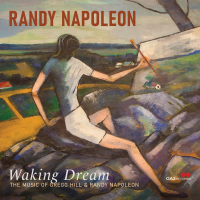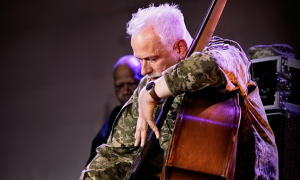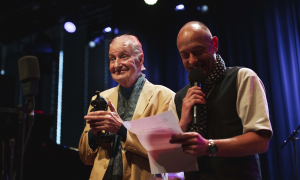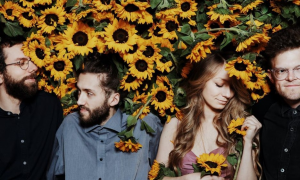Home » Jazz Articles » Profile » Herb Robertson: Abandon in the Moment
Herb Robertson: Abandon in the Moment
What attracted me to the music was the selflessness about it and the idea that it's a democratic process where everybody is equal in participation
 Amid a whorl of scraped cello, tenor sax squawks, and bass clarinet blats, trumpeter Herb Robertson paused, his eyes closed in concentration. With NSA-like hearing ability, he pierced the action with a bracing note that crystallized the unfurling improvisation. The intent listening and bold responses displayed during saxophonist
Amid a whorl of scraped cello, tenor sax squawks, and bass clarinet blats, trumpeter Herb Robertson paused, his eyes closed in concentration. With NSA-like hearing ability, he pierced the action with a bracing note that crystallized the unfurling improvisation. The intent listening and bold responses displayed during saxophonist 
Lotte Anker
saxophoneb.1958
"Once I start improvising I just can't think about other things," Robertson says. "Improvisation, to me, that's what exists: when I'm improvising, it's music." Forging a distinct sound, he combines the chops and projection of a big band lead trumpet with the imagination and fearlessness of an improviser, extending his textural range with ambitious use of multiple mutes, vocalizations, megaphones, and whistles.
Since the early '80s, he's been a fixture of the Downtown scene as a sideman to saxophonist 
Tim Berne
saxophone, altob.1954

Mark Helias
bass
Barry Guy
bass, acousticb.1947

Satoko Fujii
pianob.1958

Pierre Dorge
guitarb.1946

Evan Parker
saxophone, sopranob.1944

Frank Gratkowski
saxophoneb.1963
"I don't like to repeat myself, ever," Robertson says. "I always try to come up with something new." In March, 2009 he showcased his range in 
Gerry Hemingway
drums
b.1955
Raised in New Jersey, Robertson began playing in the fifth grade and was about 16 when he decided to pursue jazz, "the ultimate expression of trumpet."
Particularly attracted to 
Freddie Hubbard
trumpet
1938 - 2008
Robertson attended Boston's Berklee College of Music as a performance major, and played up to 30 hours a week in small combos and big bands, with visions of being lead trumpet in 
Buddy Rich
drums
1917 - 1987
Unsure whether he'd play trumpet again, Robertson was frustrated and spent roughly three years rebuilding. During this time he discovered modern classical and electronic music, feeling a connection to its atonality. This led toward freer music and exploring ways to cloak the trumpet's sound. Experimenting with warbling mutes and whispered and shouted vocalizations, he tried to blend in with groups instead of blaring above. In New York near the end of the '70s, he met like-minded musicians searching for new sounds and strategies to improvise.
"What attracted me to the music was the selflessness about it and the idea that it's a democratic process where everybody is equal in participation," he says. "I think that was the main change of the music in the early '80s: it wasn't the individual, it was more of the collective that really evolved."
Throughout the '80s, he garnered a reputation as an adventurous, uncompromising improviser sparring in Berne's groups, leading his own, and playing with a slew of others. With a string of recordings for JMT, including X-Cerpts (Live at Willisau) (1987) and Shades of Bud (1988), his brass and drums tribute to pianist 
Bud Powell
piano
1924 - 1966
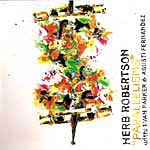 "When you hit the high moments it's the real thing and you're really surprised by it, and that's what makes it interesting," Berne says. "And Herb just epitomizes that as far as I'm concerned." Though they don't play together as often anymore, the two converge every few years to reestablish their rapport and advance the music by incorporating new influences and experiences.
"When you hit the high moments it's the real thing and you're really surprised by it, and that's what makes it interesting," Berne says. "And Herb just epitomizes that as far as I'm concerned." Though they don't play together as often anymore, the two converge every few years to reestablish their rapport and advance the music by incorporating new influences and experiences.
Throughout the '90s, Robertson performed on a series of recordings for the Cadence and CIMP labels, including co-led groups with drummer 
Phillip Haynes
drums
b.1961
Lou Grassi
drums
b.1947Dominic Duval
bass
1945 - 2016
Jay Rosen
drums
b.1961
Paul Smoker
trumpet
1941 - 2016
Robertson frequently works in Europe with European musicians, and even moved to Berlin for about three years to close the millennium. Playing with and learning the sounds of different musicians pushed Robertson's composing and performing in a free direction. "Now I'm more into the horn and I'm not writing as much: it's not written composition, it's more playing composition," he says.
Robertson's "Sick(s) Fragments" is six short sketches written to provoke the improvisation of his NY Downtown Allstars on Real Aberration (Clean Feed, 2007). On "Parallelisms" (Rubyflower, 2007), he termed the pieces "realizations," again using brief outlines to guide his partners—Evan Parker and pianist Agusti Fernandez—who had all worked together in Guy's orchestra.
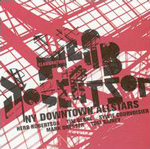 The CD was the fourth release on Rubyflower, a label that Robertson co-founded with creative music impresario Dr. Ana Isabel Ordonez to document his music. Its mission has expanded to include other creative musicians, and six CDs have been released to date. The most recent, Each Part A Whole (2008), documents a fully improvised show at The Stone by his MacroQuarktet with trumpeter
The CD was the fourth release on Rubyflower, a label that Robertson co-founded with creative music impresario Dr. Ana Isabel Ordonez to document his music. Its mission has expanded to include other creative musicians, and six CDs have been released to date. The most recent, Each Part A Whole (2008), documents a fully improvised show at The Stone by his MacroQuarktet with trumpeter 
Dave Ballou
trumpet
Drew Gress
bass
b.1959
"It's good to know that it's part of a legacy now...it's developed and it's continuing, it's evolving," Robertson reflects. "It's a survivor's music; it keeps going because people keep playing it."
Selected Discography
The Macro Quarktet, Each Part of a Whole: Live at The Stone NYC (Rubyflower, 2007)
Herb Robertson NY Downtown Allstars, Elaboration (Clean Feed, 2004)
Herb Robertson, The Legend of the Missing Link (Splasc(h), 2001)
Herb Robertson/Dominic Duval/Jay Rosen, Falling in Flat Space (Cadence Jazz, 1996)
Herb Robertson Brass Ensemble, Shades of Bud Powell (JMT-Winter & Winter, 1988)
Tim Berne, Mutant Variations (Soul Note, 1983)
Photo Credit
Lindsay Beyerstein
Tags
Comments
PREVIOUS / NEXT
Support All About Jazz
 All About Jazz has been a pillar of jazz since 1995, championing it as an art form and, more importantly, supporting the musicians who make it. Our enduring commitment has made "AAJ" one of the most culturally important websites of its kind, read by hundreds of thousands of fans, musicians and industry figures every month.
All About Jazz has been a pillar of jazz since 1995, championing it as an art form and, more importantly, supporting the musicians who make it. Our enduring commitment has made "AAJ" one of the most culturally important websites of its kind, read by hundreds of thousands of fans, musicians and industry figures every month.
Go Ad Free!
To maintain our platform while developing new means to foster jazz discovery and connectivity, we need your help. You can become a sustaining member for as little as $20 and in return, we'll immediately hide those pesky ads plus provide access to future articles for a full year. This winning combination vastly improves your AAJ experience and allow us to vigorously build on the pioneering work we first started in 1995. So enjoy an ad-free AAJ experience and help us remain a positive beacon for jazz by making a donation today.

New York City
Concert Guide | Venue Guide | Local Businesses
| More...




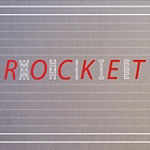




 Buy Now
Buy Now

